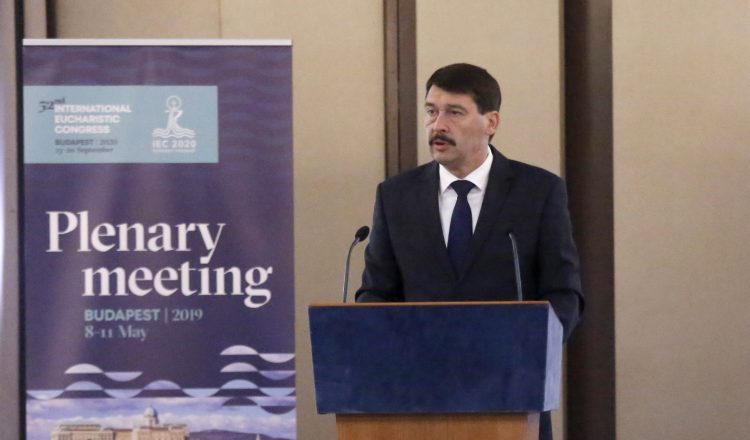
Since it was born, Hungary wants not only to receive, but also to give

Your Eminencies,
Your Excellencies,
Dear Ladies and Gentlemen,
Dear Participants,
83 years ago, a poet spoke on the radio about the Hungarian Saints.
The name of the speaker was and is well-known even today among the Catholics: Sándor Sík, poet, literary, Piarist teacher.
He said:
As “in the beginning of Christianity there is the Holy Family(…) which gives a living example to everything a Christian might ask – at the very beginning of the Hungarian Christianity there is also a holy family: Stephen, Gisela and Prince Emeric.”
Saint Stephen, Saint Emeric and Blessed Gisela of Hungary.
For us they are the blessed beginning, the beginning of a more-than-a-thousand years long story.
The history of the Hungarian state began with a dynasty, which gave a number of holy royals to the world almost unprecedented in Europe.
We know that no nation is more holy or more sinful than the others. But we do believe that nations and countries are born with a mission.
There were a great number of saints who safeguarded the young Hungarian state with their sacrifices, mercy and heroism, so that the Hungarian nation may fulfil its mission.
Sándor Sík continued his thought:
“…the Hungarian Church in the centuries of Árpád-dynasty does not want to receive any more, but to give.”
We wanted to give in 1938, when for the first time Hungary hosted the International Eucharistic Congress on the 900th anniversary of the death of St. Stephen.
Since the first Congress in Budapest 81 years have passed: in these decades history tried us again and again.
But we had the new heroes of mercy, the new martyrs of justice on our side.
Blessed Vilmos Apor, bishop of Győr,
Blessed Tódor Romzsa, Greek Catholic bishop of Mukachevo,
Blessed Sára Salkaházi, Sister of Social Service in Budapest,
Blessed Zoltán Meszlényi, auxiliary bishop of Esztergom,
Blessed Szilárd Bogdánffy, bishop of Satu Mare-Oradea,
Blessed János Scheffler, bishop of Satu Mare,
Blessed István Sándor, Salesian monk in Budapest,
Blessed János Brenner, chaplain in Rábakethely.
Eight Hungarian persons.
Eight lives rich in mercy, eight martyrdoms – both inside and outside our borders.
All of them were elevated among the blessed of the Catholic Church in the past 25 years.
Because they persevered in their faith, because they did not abandon those entrusted to them, because they did not make unacceptable bargains.
That is why they became the enemies of the authorities, that is why they suffered and died innocently.
Some of them by weapons of soldiers, some of them in prison, some trampled to death on the street and some by the hands of an executioner.
Their martyrdom is the message that even in the darkest times, during totalitarian dictatorships, in the hearts of the Hungarians the sense of justice and humanity remained a measure, and so did the fidelity and sacrifice.
The prefix of their names “Blessed” means to us, Hungarians that there is a justice kept through all the storms of history.
The justice, that this nation always said yes to a life without fear, to honesty, to human dignity, to solidarity, to free practice of religions, to peace-creating benevolence and to mutual respect.
Dear Members of the Conference,
The poet, Mihály Babits once professed his Catholic faith in this way:
“I am a Catholic, meaning, I believe in the Catholic truth, which stands above the nations and is for the whole world! (…) in the truth, which is beyond politics and the momentary necessities of our lives…”
This justice, pointing beyond politics and necessities, beyond uncertainties and changes, beyond interests and conflicts was confessed by a multitude of Hungarian Christians throughout the last millennia.
By those, who founded monastic communities from Pannonhalma to Zirc.
By those who raised towns from Székesfehérvár to Veszprém, built churches from Pécs to Bélapátfalva, and maintained schools from Esztergom to Budapest.
By those who defended the faith – with sword, if necessary – from Nándorfehérvár to Szigetvár.
By those, who saw beyond their own destiny – whether they wandered around the world or lived their busy lives in a single village and prayed for grace not only for themselves but for all the people.
By those, who prayed and gave thanks from Márianosztra to Mátraverebély-Szentkút.
By those, who wanted to give, not only to receive.
Let us remember the thoughts of Eugenio Pacelli, the papal legate of the International Eucharistic Congress, with which he opened the Congress in the May of 1938 in Budapest.
In his speech Cardinal Pacelli – who was known as Pius XII, successor of St. Peter a year later – clearly referred to the dangerous signs.
To the threat, the nations of Europe had to face in 1938.
In the grooving shade of the possibility of another war the Cardinal made it clear, what the task would be – let me quote him:
“In a world, which has been shaken, and is out of balance because of (…) incitement, the benevolent men shall join forces for the apostolic crusade of love, to promote the work of harmony, social prosperity and sacrifices…”
Harmony.
Social prosperity.
Sacrifice.
Each age has suffered, when these values became preys to the lust for power, to inhumanity, greed and negligence.
Harmony, social prosperity, sacrifice – these words have a new meaning in our days.
The 20th century was the century of wars.
Mankind is waging war even today, even if it is of a different kind: in the 21st century we are at war with ourselves for our planet and for the human civilisation.
The generation of consumerism is living in the circle of buy it, use it, throw it away and is not interested in tomorrow, in the prosperity of the following generations.
If this continues, greed, comfort and selfishness will drive humanity into destruction.
To avoid this we need to rely on each other in all our actions, more than ever.
Pope Francis has four years ago warned the world to this collaboration and the common role in his Encyclical Laudato Si’.
The Holy Father’s message to mankind:
There are undeniable truths, which shall govern our lives, therefore human liberty has its boundaries.
I trust that during the one remaining preparatory year and during next year’s International Eucharistic Congress all the visiting guests will see, that Hungary has not forgotten these undeniable truths.
Dear Members of the Conference,
Sándor Sík said:
According to the teaching of St. Stephen, to be Hungarian is a moral term. (…)
To be Hungarian is faith.
Faith in the vocation of the Hungarian nation.
This sense of vocation, distinguished guests, it has been ours for a millennium.
The mission to enrich the world through keeping our faith.
With our culture, with our steadfastness in keeping our values, with our respect for others and with our hospitality.
These are the values we have brought into the 21st century, and these are the values we would like to show next year.
Because since it was born – more than a thousand years ago – Hungary wants not only to receive, but also to give.
Photo: Marcsi Ambrus
IEC Secretariat










